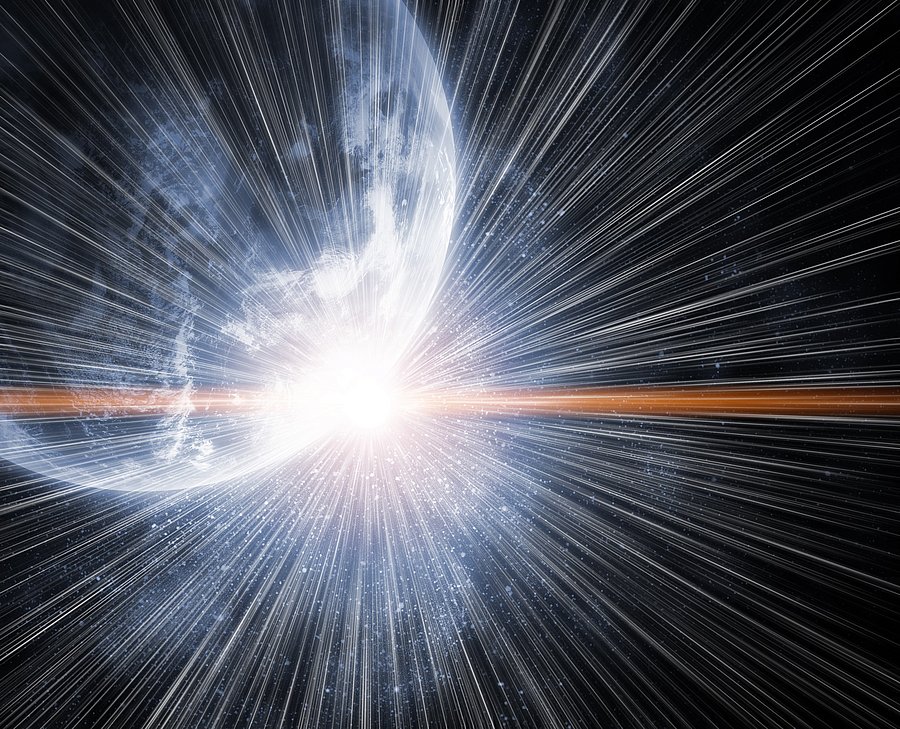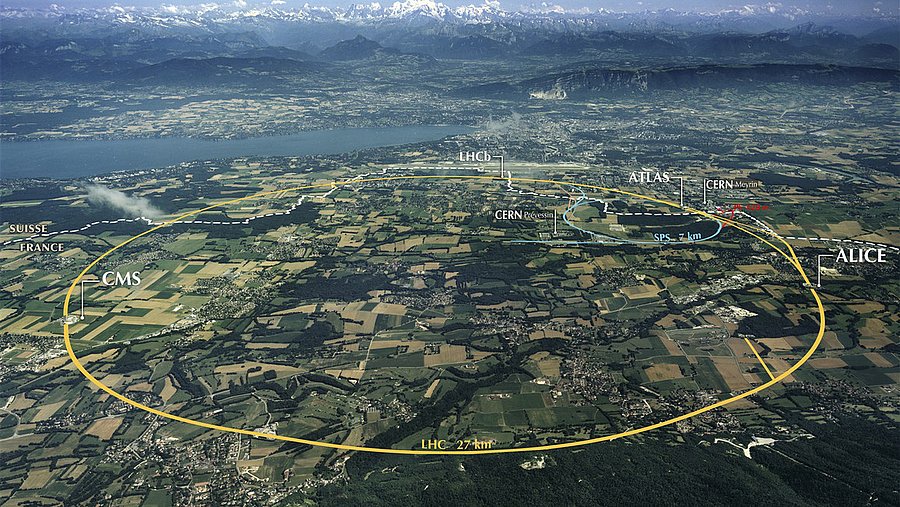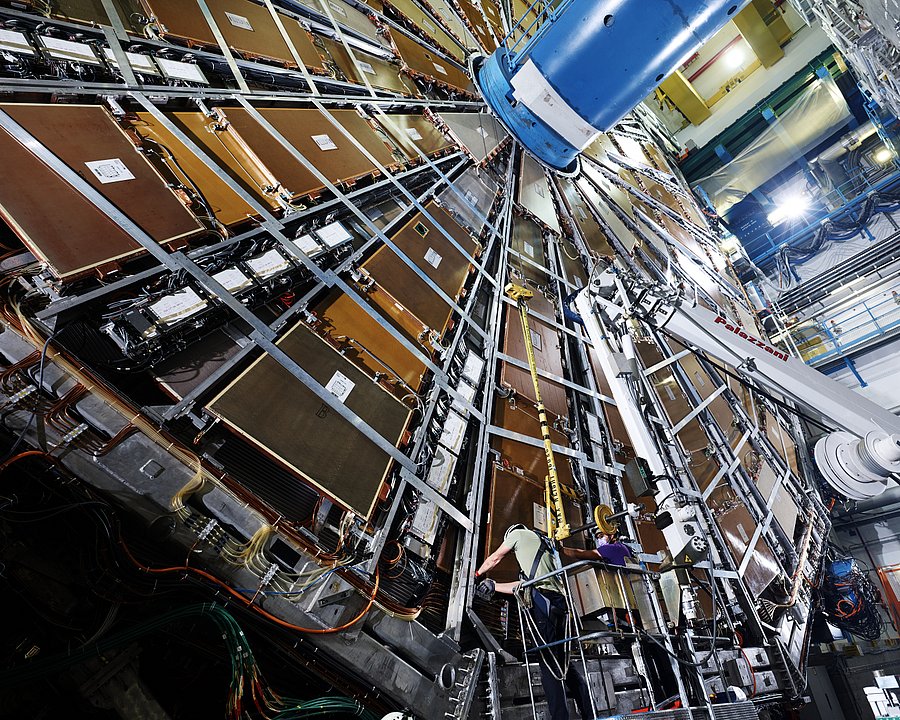Particle physics you can touch
CERN research centre turns 70 - University of Wuppertal joins in the celebrations at CityKirche

For 70 years, researchers at CERN have been on the trail of the secrets of our universe // Photo Colourbox
The CERN research centre, the European Organization for Nuclear Research, has been located near Geneva in Switzerland for 70 years. With its large particle accelerators, it is constantly pushing the boundaries of our existing knowledge about the components and rules of our universe. Thousands of people from all over the world conduct research here - including scientists from the University of Wuppertal for more than 50 years. What makes their daily work so exciting, which discoveries they have already helped to pave the way for and how the latest developments are progressing will be reported on 16 September at the CityKirche Elberfeld from 1 to 6 pm.
They are inviting anyone who is interested to join them for live experiments, take a look at modern research equipment and ask lots of questions. "Particle physics processes take place on such short time scales and such small spatial dimensions that they are not directly accessible to the human senses. This will change in the CityKirche: Here we are creating exciting opportunities for our guests to immerse themselves in this fascinating world and understand what our universe is made of and how it works," says co-host Prof Dr Wolfgang Wagner from the Experimental Elementary Particle Physics working group.
CERN turns 70
CERN celebrates its 70th birthday in 2024. Germany, as a founding member and the largest contributor, is honouring this milestone birthday with many large and small events in September. The main celebrations for CERN's 70th anniversary in Germany will take place in Berlin in the first week of September. CERN researchers are not only based in Geneva - more than 1,000 people are involved in CERN research at universities and research institutions in Germany. They have put together a colourful programme from 16 to 22 September that offers something for everyone: Exhibitions, lectures, workshops and more.
Central information about the celebrations can be found on the official event website.

Aerial view of the CERN research centre. The course of the LHC is shown // Photo CERN
The university and CERN I: On the trail of particles
Particles are accelerated to very high energies using ring-shaped particle accelerators such as the "Large Hadron Collider", which at 27 kilometres in circumference is one of the largest and most powerful in the world and is CERN's flagship project. They are observed by detectors, which ultimately record the results of the collisions and allow statements to be made about the interaction of the particles. The data obtained in this way helps to answer the unanswered questions about the development of our universe. Under the direction of professors Wolfgang Wagner and Christian Zeitnitz, particle physicists at the University of Wuppertal have been analysing data from the ATLAS detector for many years. The research focuses on measuring the properties of the "Higgs particle" newly discovered at CERN in 2012 and the heaviest of the known elementary particles, the "top quark", as well as the search for new, as yet unknown particles and forces. This research is supported by the university's own high-performance computing centre PLEIADES, with which the University of Wuppertal was one of the first German research institutions to be fully integrated into the CERN infrastructure at the end of the 2000s, allowing ATLAS data to be processed fully automatically.
At a second LHC experiment with the CMS detector, Prof Dr Katerina Lipka and her colleagues are researching the properties of the top quark in relation to the predictions of the stability of our universe and the understanding of the strong force that holds matter together.

The ATLAS detector at the Large Hadron Collider is one of the four major experiments at CERN // Photo CERN
The university and CERN II: Inspiring the next generation
Another project at CERN connects the scientists involved with the aim of making research in the field of the smallest particles accessible to the general public, especially young people. Pupils have the opportunity to experience particle physics in workshops, experiments and masterclasses. Pupils from the region also regularly come together at the University of Wuppertal for the latter: By working together with scientists and analysing original data from the LHC experiments, the young people gain an impression of how research is carried out in modern physics. One of the programme highlights is a concluding video conference with simultaneous masterclasses throughout Europe and scientists at CERN to discuss the results.
The university and CERN III: thinking outside the box of physics
In the research group "The Epistemology of the Large Hadron Collider", scientists from three nations investigated research with the LHC particle accelerator from a philosophical, historical and sociological perspective until 2023. The collaboration between the humanities and physics focussed on the question of the foundations on which particle physics can develop more comprehensive and fundamental theories of nature and which new principles of scientific development can be used in the process.
In tune with the times: current developments
The experiments at the LHC particle accelerator - the four detectors ATLAS, CMS, ALICE and LHCb - are operated by international teams in which scientists from research institutes all over the world work together. All experiments are very different from each other, each characterised by unique detector components. The LHC will be completely modernised in the coming years. For this reason, a conversion and new construction phase is currently underway to upgrade the detectors, in which the Wuppertal researchers are also involved: Preparations for the assembly of the new ATLAS pixel detector, which is due to go into operation in 2029, are in full swing, as is work on the components for the new construction of the CMS detector.
How is this going?
Since 2015, for example, the Wuppertal physicists have been developing components as part of the ATLAS experiment. The project involves 60 physics institutes worldwide, which deliver components to CERN, where they are assembled into the detector. The first detector modules are already available and are undergoing intensive testing in the laboratory at CERN. "In Wuppertal, we are redesigning the detector control system, among other things. An important component of this system is radiation-hard, highly integrated circuits, which we are developing in our group," explains Prof Dr Christian Zeitnitz.
LHC times three: plans for the next 70 years
A feasibility study is currently underway for a new particle accelerator planned at CERN - the Future Circular Collider - which will be three times as large. Based on the results, which should be available in 2025, the member states ultimately want to decide on the construction of the facility, which is to measure 91 kilometres in circumference. If the plans are realised, the go-ahead for construction would be given in the 2030s.
